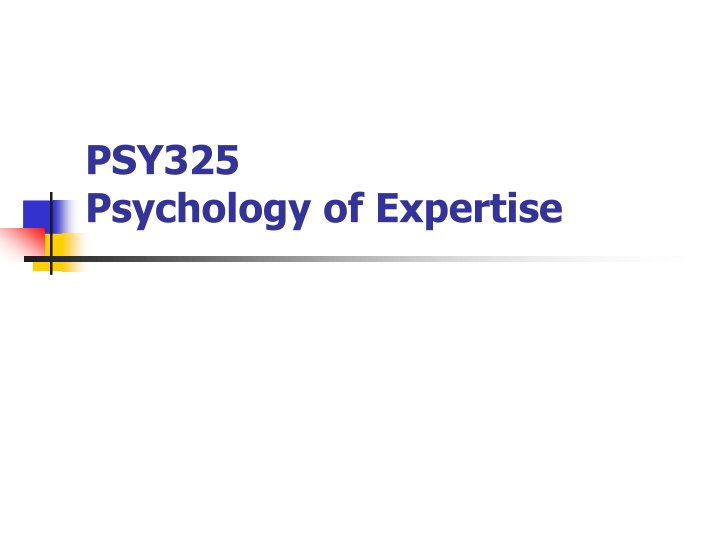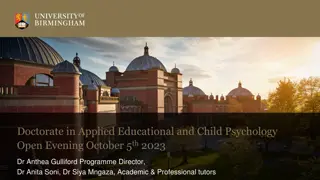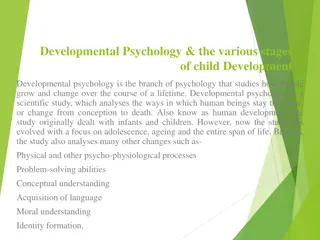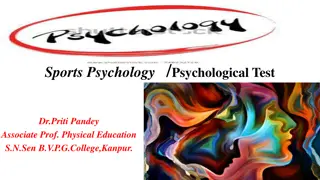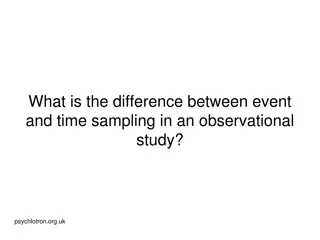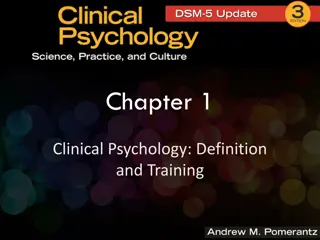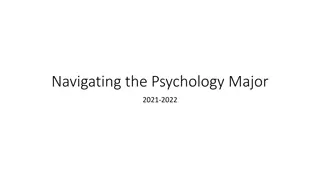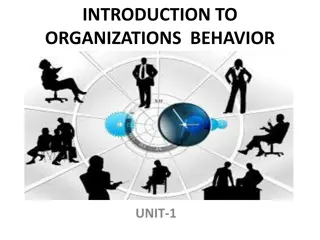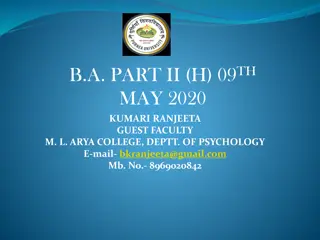Psychology of Expertise: Understanding Experts
delves into the fascinating world of expertise, covering topics such as defining expertise, exploring expert behavior, and the role of experts in society. The module, led by Module Convenor Prof. Fernand Gobet, aims to provide insights into psychological factors that contribute to expert performance, research methods used to study expertise, and broader aspects like neuroscience, sociology, and artificial intelligence. Through lectures and readings, students will gain a deeper understanding of what it means to be an expert and how expertise can impact various domains. The course also covers evaluation criteria, including coursework essays and unseen exams, to assess students' comprehension of the subject matter.
Download Presentation

Please find below an Image/Link to download the presentation.
The content on the website is provided AS IS for your information and personal use only. It may not be sold, licensed, or shared on other websites without obtaining consent from the author.If you encounter any issues during the download, it is possible that the publisher has removed the file from their server.
You are allowed to download the files provided on this website for personal or commercial use, subject to the condition that they are used lawfully. All files are the property of their respective owners.
The content on the website is provided AS IS for your information and personal use only. It may not be sold, licensed, or shared on other websites without obtaining consent from the author.
E N D
Presentation Transcript
PSY325 Psychology of Expertise
Module Convenor Prof. Fernand Gobet E-mail: fgobet@liv.ac.uk Office hours: Thursdays 1 pm 5 pm ERB 2.57 Current research Psychology of expert behaviour Computer modelling of expert behaviour Computer modelling of the acquisition of language
Aims of Lectures To provide an understanding of the psychological factors underpinning expert performance To describe a wide range of research methods used to study expertise To provide an understanding of the role of experts in society
Readings Textbook Gobet, F. (2015) Understanding expertise. London: Palgrave. VITAL PPT presentations Books in the library http://readinglists.liverpo ol.ac.uk/lists/EFF9082D- 8D33-5C2C-0B13- 2BA9B6D057A3.html
Articles http://chrest.info/PY3602-Psychology-of- Expertise/PY3602-Psychology-of-Expertise.html Library: DISCOVER...
Content of Lectures Introduction Perception and memory Problem solving and decision making Learning and education: practice vs. talent Development and aging 1. 2. 3. 4. 5.
Creativity Personality and intelligence Gender differences The neuroscience of expertise 10. Broader aspects: sociology, philosophy and artificial intelligence 11. Exam preparation 6. 7. 8. 9.
Evaluation Coursework essay Weighting: 25% 1 question from a choice of 6 questions Unseen written exam (two hours) Weighting: 75% 2 questions from a choice of 6 questions
The Dual Meaning of Expertise Definition of the Oxford Talking Dictionary (1998): Expert opinion or knowledge; know-how, skill, or expertness in something Two essentials aspects: knowledge or even opinion knowing that skill knowing how 1. 2.
Expertise as Experience Amount of time an individual has spent in a domain A weak definition Experience does not correlate much with expertise e.g., amateur tennis players Deliberate practice offers a better measure Ericsson et al. (1993)
Expertise Defined by Diplomas e.g. use of PhDs, professional certificates Common definition Diplomas have weaknesses Based on socio-cultural criteria Often do not test real-life skills, but declarative knowledge e.g. medecine, psychology Provide little detail about level and nature of expertise
Ecological Measures (I) Measures that are part of the culture of the domain Business amount of wealth Science number of citations Writing number of books sold Socio-cultural biases are possible e.g. fashion, random factors
Ecological Measures (II) Ideal: objective quantitative measure of expert performance within a domain Time to run 100 m This is rare outside sports Rank-ordering systems Belt system in karate FIFA s ranking of national football teams ATP ranking in tennis These systems have limitations
Ecological Measures (III) Elo rating Elo (1965) Mostly used in chess, but also in table tennis Takes into account outcome of a game (win, loss or draw) skill level of the opponent Updated after every competitive game Provides a precise and up-to-date measure of expertise Explains why much research has been done on chess
Expertise as Replicable Performance in the Laboratory Ericsson and Smith (1991) Chess masters must find good moves in chess problems Medical doctors should find the correct diagnosis A reasonable requirement, at least in some domains But there are exceptions: Developing a new ground-breaking theory in physics Creating a new style in art
Expertise is Acquired with effort and intentionally Bereiter and Scardamalia (1993) without effort and implicitly, through talent Eysenck (1995) Arguably, the way expertise is acquired is not relevant to its definition
Expertise as Fluid Behaviour Behaviour is automatic and requires little conscious control Valid with many types of expertise, but not all The opposite definition has also been proposed: The expert addresses problems whereas the experienced nonexpert carries out practiced routines (Bereiter & Scardamalia, 1993) Routine actions hinder the development of expertise (Ericsson et al., 1993)
Expertise as Social Label Label given by Society Group of people Sometimes irrespectively of real competences Expertise can only be used within a specific context Stein (1997) Expertise resides both in the expert and a social system
The Definition Used in this Class An expert is somebody who obtains results that are vastly superior to those obtained by the majority of the population Can be applied recursively A super-expert is somebody whose performance is vastly superior to the majority of experts Can be applied to common domains of expertise language, walking, breathing Can be used with know how and know that
Studying Expertise (I) Sheds important light on learning This can lead to better methods of instruction and training in general Can lead to better ways of coaching experts Better methods can have stunning effects e.g. Swimmer Mark Spitz wouldn t qualify for semi-finals now
Studying Expertise (II) Can inform the development of artificial expert systems Offers a unique window on human cognition Research on expertise has identified several general cognitive mechanisms role of pattern recognition in decision making progressive deepening selective search Mirror image to neuropsychology Impaired performance vs. amazing performance
Studying Expertise (III) Emphasises the positive aspects of human psychology Contrary to most psychology, which focuses on negative aspects of human psychology (e.g. pathology) Has anticipated at least some of the claims of positive psychology Seligman and Csikszentmihalyi (2000) Focuses on hope, optimism, strengths and virtues
